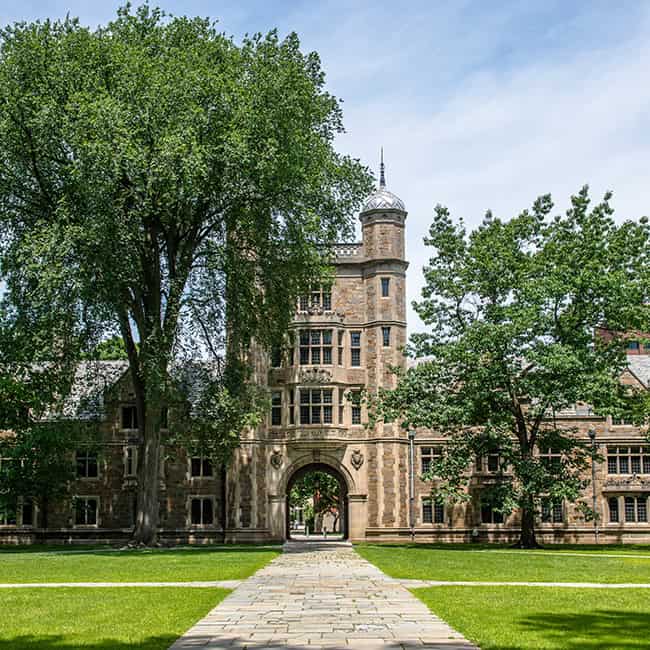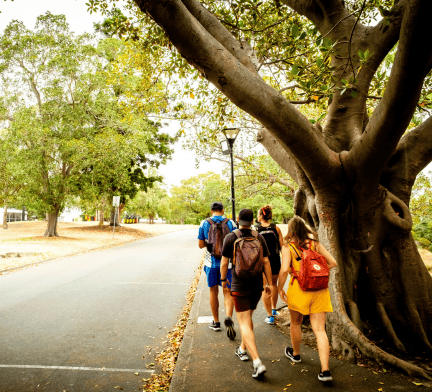As you plan to apply to college, college visits can help you learn more about schools and trim down your final college list. Try to visit as many colleges as possible to get a sense of the differences between campuses and the unique attributes of each institution. It’s best to sign up for an official tour, but if that’s not possible, many colleges offer brochures to take a self-guided tour around campus. Here’s what you can expect in a typical college visit, and some tips for the experience.
Arrival
If you registered for the tour beforehand, be sure to let them know that you’re there. And if you didn’t register beforehand, ask how you can before it starts. Many schools keep a record of “demonstrated interest,” so you’ll want them to know that you took the time to visit and learn more about the school.
Size
At larger schools where more families are visiting, you might have a tour group of 30 or 40 people. Smaller schools that might receive less visitors could have tour groups with just two or three families.
Time
On average, college tours usually last one and a half to two hours. That includes the presentation and the walking tour if both are included.
What You’ll See
Smaller colleges are often able to show off every area of campus, while the bigger schools can only highlight certain parts, unless you’re on a driving tour. For the bigger schools, it’s helpful to bring a map if there’s one available, so you can see where you are in relation to the rest of campus as you’re walking around.
Who You’ll Meet
Your tour will likely be led by a current student, though someone from the admissions office may lead the tour or tag along.
Swag
Some schools hand you a swag bag when you finish a tour. That can include a t-shirt, water bottle, sticker, key chain, or other merchandise with the school’s name and logo.
Tips for College Visits
- Go during the academic year. It’s ideal to visit a college while class is in session. By checking out the campus during this time, you can observe current students in action and attend a college event such as a theatre production or sporting event.
- Be prepared. Before you arrive on campus, think of the information you want to learn about the college, and ask questions about anything you don’t find out during the tour.
- Make yourself comfortable. Bring clothes that are appropriate for the weather, shoes that are designed for walking, and plenty of water and snacks.
- Take notes. As you tour each campus, write down what you observe and the information you learn, such as the layout of the campus, interesting academic programs, and special admissions opportunities. Leave time after each visit to process your thoughts as a family and share your reflections and opinions of each school.
- Take advantage of special opportunities. Some colleges allow students to stay overnight as a guest of a current student, observing college life firsthand and attending classes and activities for the day. Contact the admissions office to see what’s offered at each school.
- Speak with students. Chat up current students apart from the tour and ask questions to give yourself insider knowledge on things like campus culture, accessibility to professors, safety, and more.
- Check out places of Interest. Just because the official campus tur doesn’t stop by a spot, doesn’t mean you can’t check it out on your own! If you have a place you are interested in, make time to see it. That may include the health centers, the gym, the library, the dorms, and the student center.
- Go to the source. If you have a major in mind, swing by the academic department to see if you can speak with a professor. If you are an athlete or a musician, try to set up a meeting with the coach or music director before you arrive on campus. They may serve as a shepherd through the application process.
- Eat lunch or dinner. Make time to enjoy a meal on campus. You can learn a lot by watching students in the dining hall or cafe. If you have dietary restrictions, you will also find out if there are gluten-free, vegan, organic, and kosher options available.
- Tour the town. Remember you will be living here for four years and not all of that time will be spent in class or on campus. Take time to walk or drive around the town to get a preview of the amenities offered relative to your lifestyle, including restaurants, places of worship, shopping, etc. College life is more than the dorms and quad, so get to know the surrounding community.











